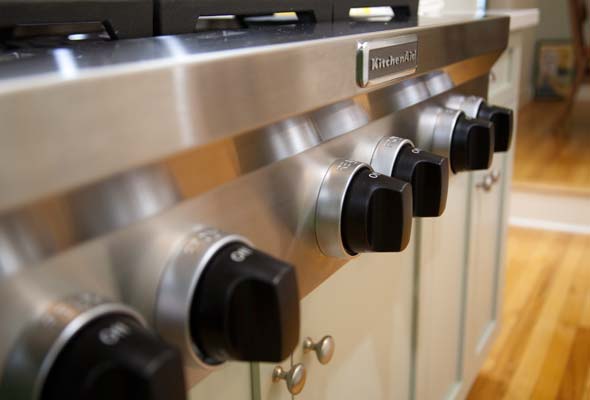
Nonetheless, don’t let anyone—anyone—tell you that living through a renovation is no big deal. If they do, consider them devil spawn determined to usher you down to the ninth circle of Hades, because remodeling is pure, unadulterated hell. I am (barely) living proof.
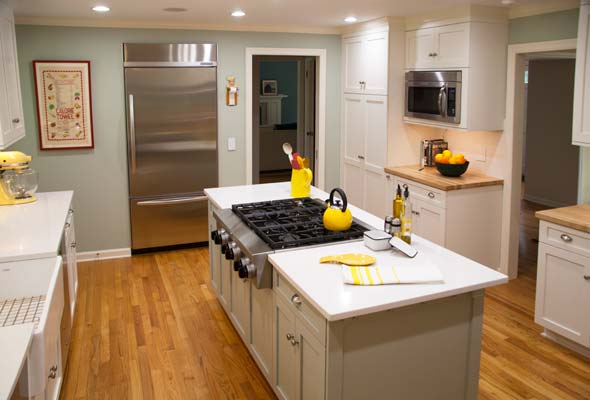
Renovating is also costly as hell. Last week I did a little tallying, seeing as I certainly hadn’t been calculating all the extras as I breezily okayed them in the moment, i.e., 5500-degree-Kelvin light bulbs to mimic sunlight, two more floor vents to keep my feet warm in the winter and cool in the summer, and custom cutting-board cabinets. I spent so much, so fast, American Express called to see if someone with particularly exceptional—and expensive—taste had stolen it.
The big numbers didn’t just pertain to money. During the past three months, I spent more time with Dan and his band of merry craftsmen than I did with The One. I had the pleasure of Dan’s company from eight to five, six days a week. That’s 594 hours of floor-juddering, ceiling-banging, wall-moving, window-rattling un-alone time. What I wouldn’t have given to have had just one hour of house-shaking private time with The One, if you know what I mean.
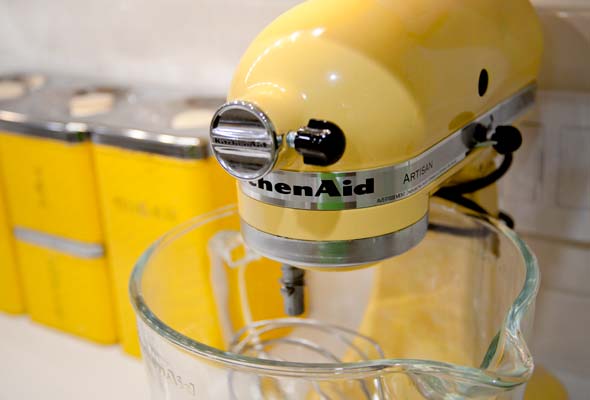
The upshot, though, is I am now the potentate of my very own custom-designed kitchen that I can cook in, bake in, and almost burn down again. I think perhaps the greatest compliment came from The One, who very uncharacteristically held his tongue through the entire process, when he said the kitchen was perhaps the most functional he has ever cooked in. That was exactly what I was aiming for.
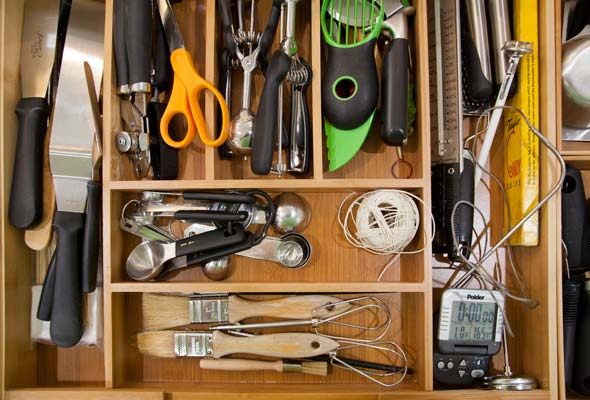
Let’s be clear about one thing: I designed this baby. Everything was built around the appliances, which were donated by KitchenAid. I chose a double wall oven, a warming drawer for plates that doubles as a bread proofer and slow cooker, two dishwashers (yes, two), a 36-inch gas range top with six burners, a microwave, and a refrigerator with the freezer on the bottom (The One’s only request). I already own an iconic yellow KitchenAid stand mixer to match our antique canister set and bread box, so I didn’t need one. (Okay, fine. I have five mixers. I’ve been kind of collecting them for the past 20 years.) Still, squeezing it all in without changing the footprint of the original kitchen’s cabinets and island left my contractor and now good friend Dan gobsmacked.
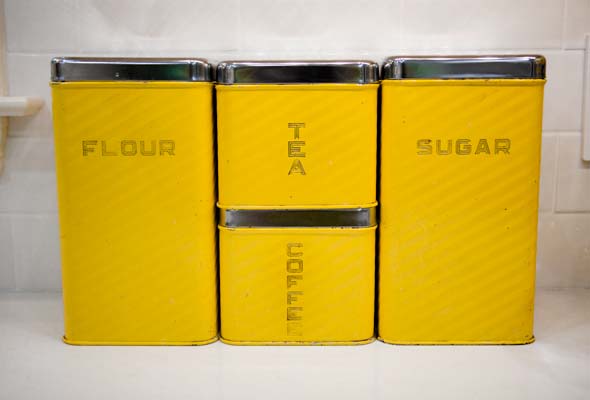
Since a battalion of you have been asking me for all the deets, colors, brand names, sizes, materials, sources—not to mention inviting yourselves over when the work was done—I thought I’d give you a blow-by-blow account, share some ideas and tips, and in so doing, either encourage or dissuade you should you be contemplating redoing your kitchen.
ISLAND
I wanted to give myself ample room to work on both sides of the cooktop, so the first thing we did was increase the surface area of the island’s countertop. To do this, I had to make a slight concession: Whenever the top oven door is open, I kind of, well, have to suck in my gut to get around the island. The One, of course, shimmies through with nary a problem. But a few inelegant maneuvers and eye-rolling looks among guests are worth it for the 540 luxurious extra square inches I gained.
We used all Pentalquartz in what they call the “lattice pattern” for the countertops throughout the kitchen. I don’t know about you, but I don’t see no lattice—just some soft feathering in a light gray. And for the record, we tested samples of the material by soaking it in vinegar, leaving red wine on it overnight, using it as a cutting board, dropping it, and placing a blazingly hot sauté pan on top of it. The only thing I didn’t do was shoot it with a bullet. I think of it as my Superman counter.
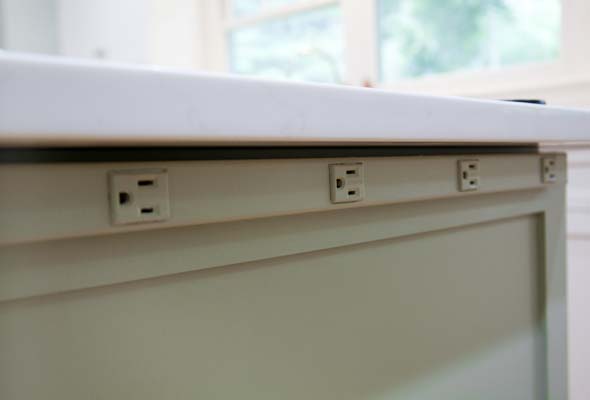
We also installed electrical strips on the ends of the island, as well as tucked under the upper cabinets (no visible outlets!), so I could in theory use 31 appliances at the same time. Not that I ever would. But I could. And knowing that somehow comforts me.
CABINETRY
For all the cabinets, cupboards, and pantry, I went with Touchstone in the Norwich style, painted the whitest white they had. It’s a mid-price cabinet source ($15K for our kitchen) that manufactures solid, durable products, but like any company, it came with its own set of problems. Some elements needed to be replaced, and one door was warped and didn’t close properly, which to the company’s credit it replaced ASAP (read: three weeks).
Pantry and Soft-Closing Drawers and Doors
I knew I wanted a pantry with pull-out drawers that are soft-closing (a true revelation) instead of our ridiculous kitchen closet masquerading as a pantry.
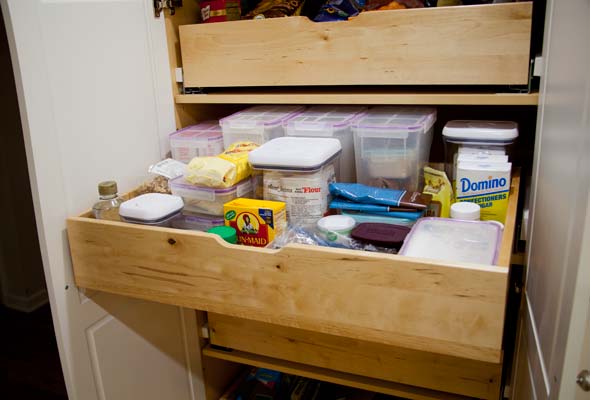
I was adamant about it, even though The One thought I’d never be able to fit all our food into it. Oh ye of little faith. Not only was I able to stow everything inside, I had room to spare—which meant I could go wild with staples for my newest obsession: Chinese food. (Never has Amazon Prime seen so many packages of dried chiles or bottles of Asian oils, vinegars, and fish sauce fly off the shelf so fast.)
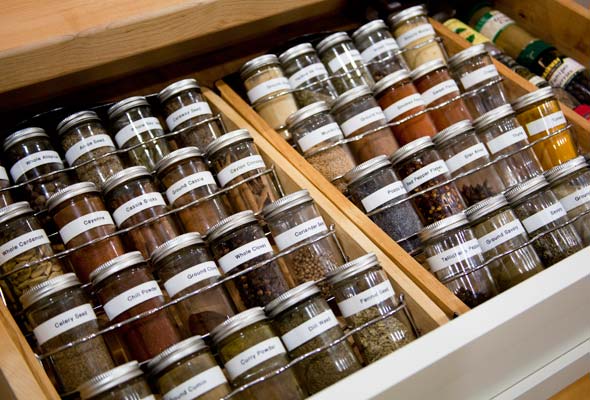
Our biggest problem with the old wannabe pantry was that our spice collection was taking up enough space to park a Volvo, and I wasn’t about to devote valuable pull-out drawer real estate to all those bottles. So I insisted on a nifty and narrow vertical pull-out rack that nestles between the pantry and the counter—something I had seen in those addictive shelter magazines.
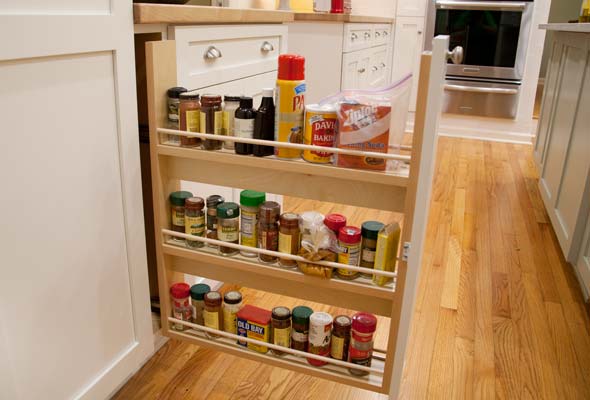
What a ginormous waste of space and money. It’s hard to see the bottle labels, larger and/or odd-size containers simply won’t fit, and hell, no, I was not about to get on my hands and knees for 1/4 teaspoon of za’atar from the bottom shelf. Fatty Daddy don’t do dat, child. I fixed this pricey hiccup by sliding two horizontal spice racks into a drawer. Best thing I ever did. Everything is easy to see and get to, and I can tell at a glance when I’m running low. But since this couldn’t accommodate all my spices, I use the pull-out rack to store all the items I rarely use.
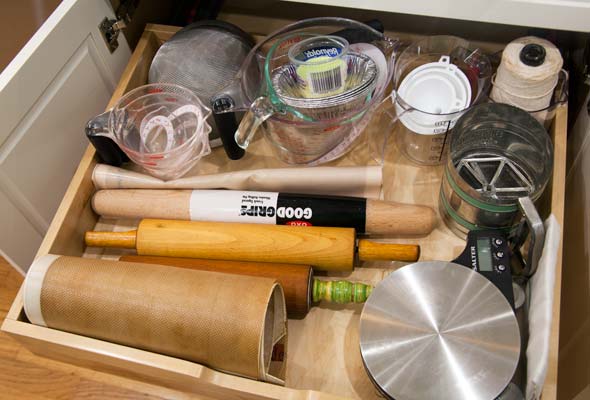
The kitchen, like the pantry, has lower cabinets with pull-out shelves. I feel like one of those dancers in a 1950s commercial for the kitchen of the future, given that I like to run around and open the cabinet doors and, with no more effort than that of a single finger pull, open all the drawers. Then I dance through again, bossa nova style, closing some with a backward tap of a toe, others with a knee bump, and the top drawers with the slightest sway of a hip.
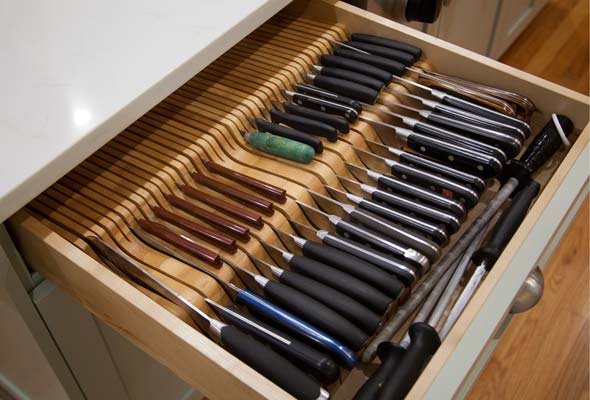
Without a doubt the biggest problem we had with Touchstone was that once the pantry shelves were filled with all those Amazon grocery orders, they didn’t close with that Donna Reed touch of a finger. I had to heave rather indelicately against them. Dan spent the better part of two days jury-rigging the drawers, which now glide like Kristi Yamaguchi skating to a Carpenters’ medley.
Would I recommend Touchstone? Yes. They are far superior to the IKEA cabinets of the world and aren’t that much more expensive. Just have a creative and patient contractor who has the foresight and strength to pin you down and rip the phone out of your hands before you can call your local dealer and make such a spectacle of yourself that it gets around town and you’re banned from any and all future dinner parties because you’re known as the town psycho. Not that it happened to me. Honest. Kinda.
LC Save-Your-Ass Note:
Always, always take pictures as soon as anything is delivered to your home, whether cabinets, appliances, tiles, lighting, etc., while it’s being unpacked, and then again after it’s put into place. You never know when a little hard evidence will be needed. Warped doors, anyone?
SINK AND FAUCET
The One wanted to buy the sink and the faucet as a gift, which I thought was a very kind gesture as I was footing the bill for the renovation. (I also wondered if it was a play for control—a way to get his tastes in there—but thought better of it. Hey, free is free.) Knowing me as well as he does, he smartly capped the price. Dagnabit.
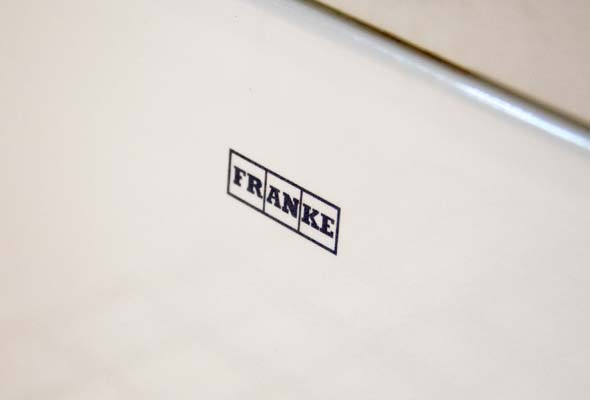
I struggled valiantly not to pick out the priciest, trendiest items on the market, but even with a budget and a saleswoman who was a tougher negotiator than Nixon, I picked out a much-envied Franke farm sink and a swanky gooseneck faucet and sprayer from Perrin & Rowe (Rohl).
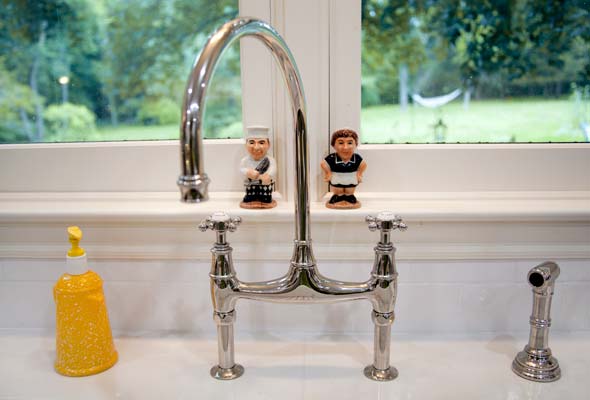
LC Vertically Gifted Cooks Note:
The bottom of any gorgeously flat Franke sink is very, very low, so expect to spend quite a lot of time bent at the waist scrubbing caked-on pots and pans. Throwing dinner parties for your local chiropractor or massage therapist ain’t such a bad idea.
RANGETOP
As some of you know, I was over the moon because I was intending to get KitchenAid’s 36-inch induction cooktop. I’ve used induction on TV and loved it. At least, I thought I loved it. But after extensive cooking on induction, making everything from steaks to sauces (rather than on TV, where I only stir once or twice and blithely go on to the next step in the recipe because time is so short), I fell fast out of love. I just can’t get the kind of subtle, incremental changes in temperature that I’m accustomed to. Plus, I missed seeing the flame. It’s not just a nostalgia thing; it’s another accurate indicator of heat.

Luckily, KitchenAid was kind enough to swap it out for the 36-inch gas rangetop I now have, and I have to say if induction cooking was a tepid romance, this is full-on six-burner lust. Unlike my old and fairly excellent Viking cooktop with knobs on the top, my KitchenAid rangetop has the knobs in front, allowing for a full 36 inches of burnin’ love. That’s five inches more than I had before. For the first time I’m able to juggle several 12-inch skillets and a few saucepans at once.
Another great feature is the simmer feature. It’s excellent for turning chocolate into a puddle, melting butter for ghee, and letting me get a true simmer on—you know, those lazy bubbles that cookbook authors are so fond of rhapsodizing about in recipes for long-cooked sauces or braises.
The One just said to make sure I say how butch it makes me feel cooking in front of it. All right, all right. There. Done.
DOUBLE WALL OVENS
Let me say upfront that I haven’t used the wall ovens as much as I’d like, seeing as this summer hasn’t really brought us baking and roasting weather. But the half-dozen or so times that I’ve fired them up, I’ve been quite happy. First, both ovens came up to temperature relatively quickly (although our old Dacor ovens were faster) and held the temperature flawlessly (our Dacors were a disaster, swinging up to 50 degrees in either direction).
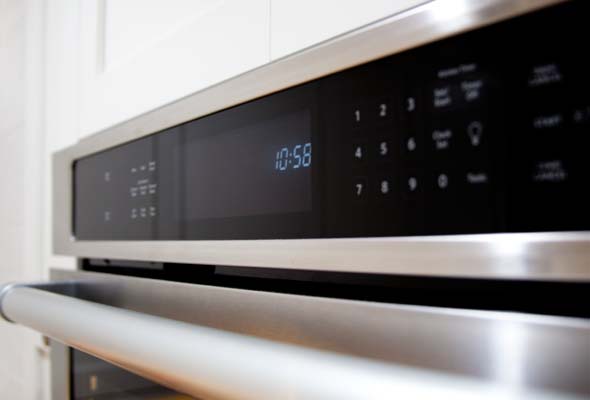
Above the top oven is a wicked-cool control panel with icons for absolutely everything you can possibly do with it—bake, broil, bread proof, convection bake, convection broil, and convection roast. It’s like watching an animated cartoon. And just this weekend I discovered that if you select convection bake, the oven actually asks, “Convert recipe?” If so, it will automatically adjust the cooking time and temperature from an ordinary recipe (convection cooking requires less time and a lower temperature to get the same results). Do you know how many sheets of chocolate chip cookies I could have saved from an early and untimely death had I had this years earlier?
All that electronic help is a good thing, because I found the instruction booklet to be extremely light on information. (In fact, I found all of the KitchenAid instruction booklets to be vague—which is odd for such an amazing cook-friendly company.) Both Dan and I were scratching our heads over several features, trying in vain to figure out what the instructions meant. For example, the ovens have one rack each that pulls out to almost double depth, making basting, taking a chicken’s temperature, or adding more ingredients to a pan a cinch—not to mention helping you avoid those primal yowls and sizzling flesh as you burn your knuckles on the heating element. We searched and searched for any mention of what to do with the yellow caps that cover the two front feet of each rack. Unless we missed it (and that is very possible), we couldn’t find it. We eventually surmised they were made of silicone and were meant to be there. Wrong! I took a look inside last week only to find what looked like very Phantom of the Opera-ish candle drippings on both sides of the oven walls.
More on the ovens when the colder weather creeps in.
MICROWAVE
Our choice of a microwave was based strictly on size. And the only one that would fit was a microwave-hood-convection-oven combo designed to be mounted above a stove as it also acts as a vent. But the convection feature was moot, because we couldn’t vent it properly. And yes, a countertop model would have solved our problem (as the cabinet guy reminded me again and again), but The One and I hate cluttered counters, so we nixed that idea.
Dan and his guys tried everything they could think of to make a bottom-mount appliance fit elegantly into a slide-in cabinet. I got to the point where I was practically shouting, “Forget it! Forget it! We only cook frozen dinners in there every once and a while anyways!” But Dan, being amazingly impervious to the hysterical rantings of a strung-out homeowner living through a renovation, led me out of the kitchen each time until they had fit it just so. So now we have a kick-ass Lamborghini of a microwave that we can only take on Yugo drives every once and a while.
LC I Need My Space, Man Note:
For those interested in an under-mount microwave/convection combo, it takes after its bigger brother, the wall ovens, asking all sorts of questions to make sure what you’re cooking, roasting, baking, melting, or defrosting comes out perfectly. I think it would be useful for a smaller kitchen in which there’s no room or budget for a full-size convection oven.
DISHWASHERS
Our new dishwashers are better than couples therapy. Let me explain. When we had just one Bosch, which was a fine machine, The One and I invariably got into arguments over my stuffing it full of dishes, glasses, pots, and pans. I shoved everything short of the cats in there. For some misguided reason, he believes that there’s some kind of honor in washing bowls and pots and pans by hand. Me, I think if God didn’t mean for us to cram dishwashers full of every possible washable item, he wouldn’t have created electricity. Period.
One of The One’s biggest arguments for doing dishes by hand was there was no way to fit pots and pans or big bowls in the lower drawer. “Ah, but look, my love,” I said recently as I grabbed both sides of the top drawer of our new KitchenAid beauty. “It raises and lowers.” Pots of enormous size can fit on the bottom while smaller items can fit on top. I watched his face screw up in frustration. Having two dishwashers—his, shall we say, “suggestion”—allows me to stuff to my heart’s content.
“Well, there’s no reason we can’t hand-wash the silverware,” he replied. He grew stymied as I counted “One, two, three, four, five, six, seven, eight, nine” compartments for cutlery. Almost double what we had before.
“Fine. But it takes too long to do the dishes.” To that I didn’t have an answer. They do take an inordinate amount of time to go through the longer wash cycles, something I remember happening on only the pot scrubber setting from our old machine. I did try using some of the shorter cycles, but they don’t clean a really full load as well. So for now, it’s “Pro Wash,” “Heavy Duty,” or “Normal Wash,” and I jump up and open the door to avoid the heated drying cycle. (I find the cool room air-dries them instantly.) The only problem with that is the damn things are so freakingly quiet I can’t always tell when the wash cycle is over. On more than one occasion I’ve had to kneel down and put my ear up against the door. I know, I know. Trés uptown problem.
LC Rack, Whack, and Roll Note:
We have very long stemware, which can’t fit in the dishwasher if the top drawer is in the raised position to accommodate larger pots below because of the culinary tool rack, a shallow drawer above it designed for holding cooking utensils. But besides getting in the way of our stemware (I’ve broken the foot off two Champagne glasses), the rack has an odd configuration of pegs, making it hard just to nestle in a bunch of knives, wooden spoons, and silicone spatulas. So after a few days, I removed one of the culinary racks and stored it in the basement. My advice: If you have inordinately tall stemware, save yourself a bit of money and buy the model without the tool rack. It cleans just as well without it.
REFRIGERATOR
While I was dutifully doing my refrigerator research, I read reviews from people who bitched about food on the door going bad because the temperature wasn’t cool enough on the model I was leaning toward. Now, unless they were stocking it with enough food to feed the state of Montana or thought 65 degrees an ideal refrigerator temperature for energy conservation, I have no idea what they’re referring to. I’ve filled the fridge to full capacity—even storing raw milk in the door—and I’ve never had a problem. In fact, the temperature is extraordinarily consistent, which means no more cool-ish orange juice on the top shelf and frozen lettuce in the vegetable crisper as our old fridge was wont to give us.
Maybe they used the thermostat incorrectly, but I don’t see how. This is the first fridge I’ve ever owned that has exact temperatures, not simply arrows pointing up and down saying “Warmer” and “Colder.” I’ve set the fridge at 38 degrees and the freezer at -1 degrees, and we’ve been chilling ever since.
There are all kinds of ancillary buttons and features, as with the ovens, that I haven’t gotten to use yet. There is one that simply says, “Holiday Mode.” I thought it was a setting that compensated for an extra-stocked interior and more-than-usual opening and closing of the doors common from mid-November to early January, but it’s actually for the Jewish Sabbath and holidays. “The door can be opened and closed at any time without concern of directly turning on or off any lights, digital readouts, solenoids, fans, valves, compressor, icons, tones or alarms,” says the instruction manual. I’ve never owned a religiously tolerant fridge before.
The only thing that drives me crazy is that sometimes there’s the thwank! of a coil when I open or close the freezer drawer. It drove me so crazy that I then drove Dan mad by asking him to noodle with it. Alas, he couldn’t fix it—his first true failure. Then I visited my friend Ellen, who has another brand of fridge, and it thwanks worse than ours. Ever since, when I visit friends or am invited to dinner parties, I’ve insinuated my way into people’s kitchens when they were empty to see if their freezer-on-the-bottom fridges thwank. (You wouldn’t believe some of the looks I got from the hosts as I was caught opening and closing their freezer drawers.) Bottom line: I guess it’s an issue with many brands.

AND THE INSANITY CONTINUES
As if living through almost 70 days of disruption wasn’t enough, The One and I have hired Dan to rip up and enlarge our backyard patio. Stone, masonry, plants, and trees all have to be moved to make way for more stone, masonry, plants, and trees. Welcome to homeownership, I guess.

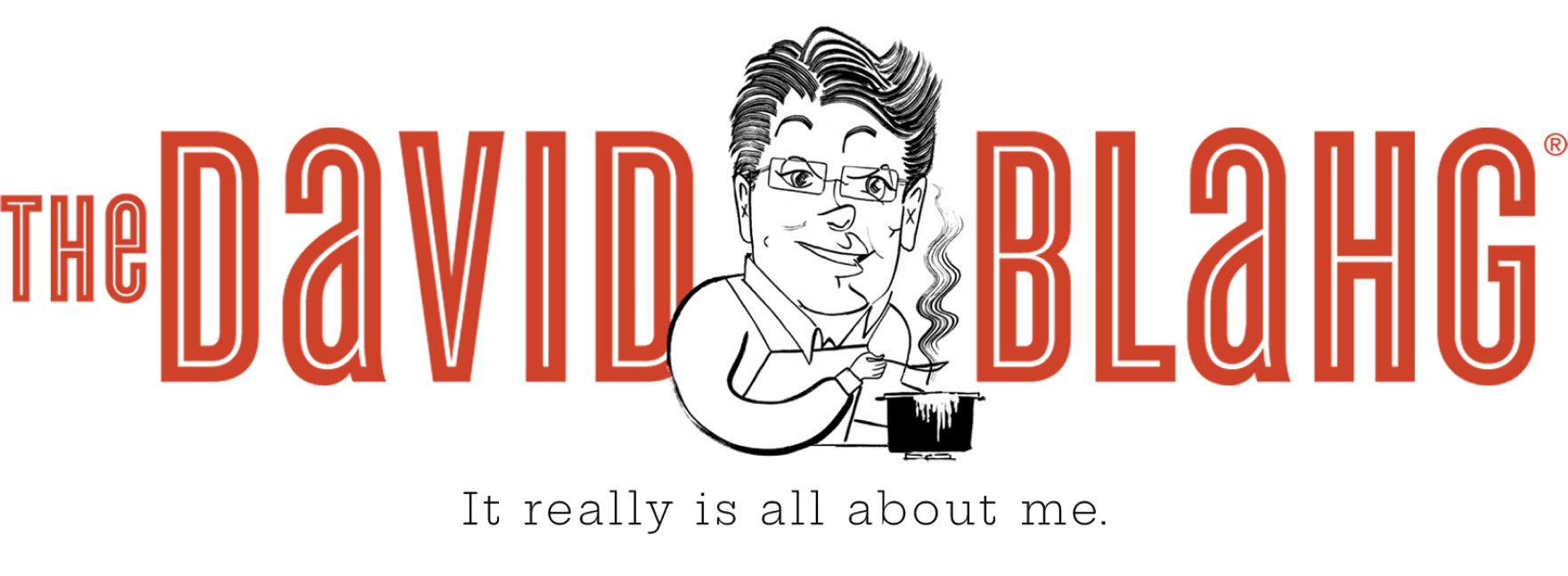
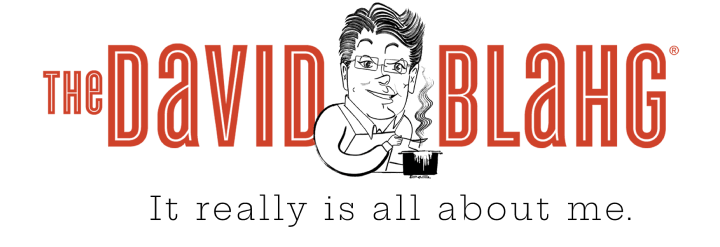










David-
Great kitchen. Found your blog while researching Touchstone Cabinetry. We are just about to embark on our renovation that currently includes a very similar Touchstone cabinet. Are you still happy with quality three years later? Are thes frameless full overlay? Also did you do plywood or melamine cabinet box construction ( this is my final decision point with which I am struggling). Appreciate any insights you have. Kitchen looks awesome.
Mark
Mark, still love them. They’re frameless and they’re plywood (from what I recall). Hope that helps!